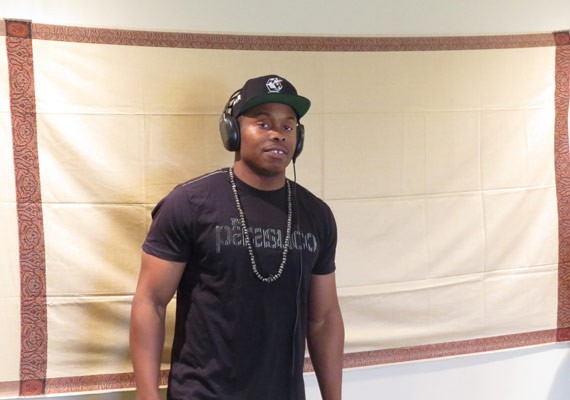"A lot of my motivation comes from being locked up and thinking about Damon," says rapper Corey Wright, 32. On an early November morning in 2006, Damon Crooks was downtown when a brawl broke out. Wright, raised in Uniacke Square, got caught in it. Next thing Wright knew, he was being arrested. His hands were covered in blood. He was told that the American sailor had been stabbed in the scuffle four times, once through the heart, and had died on Argyle Street.
Three years later, amid conflicting testimonies and confessions, with a city thrown into international spotlight and desperate to set an example after record rates of street crime, Wright was sentenced with manslaughter and required to serve five and a half years in prison for murder. Last month, on May 28, Wright was released on day parole from Springhill Penitentiary.
"His girlfriend and my ex-girlfriend were pregnant at the same time," Wright tells me. He's been staying 45 minutes outside of Halifax since his release, spending time with his kids. "Every time I look at my youngest son I think about Damon's daughter—and I just...I think about how I made his girlfriend a single mother." He's silent. "I'm sorry," he says.
Before he went downtown that night, Wright had been working on a music career under the name Vinny Deniroz, using rap to overcome his difficult experiences: an absentee father, getting kicked out by his mom, selling crack at 16 and a history of violence. He had been working on tracks at Village Sound Studios and wanted to make a million dollars. "When I was younger, I didn't think I was good enough. I didn't think I had the juice to be good at rapping," he says. "When I was younger, I was lost, I was out in the streets wearing a mask. It wasn't really me. I had to portray something that I wasn't really comfortable being. But because of what happened, I can actually be me now. I don't have to wear a mask and be all hard. I don't want to be that guy. I know I'm not him, but he is a piece of me. But now I know I can do it."
This week, Wright, under the name Corey Writes, releases Appreciate the Wait, a mixtape that will be followed by another in a few weeks and a full-length album in a couple months. "I have about 300 songs," he says. "Appreciate the Wait is a shout-out to my true, true fans who have been there since day one. Every time I posted a freestyle, they were there. They waited and waited, and I appreciate it."
While incarcerated, Wright wrote. A lot. He would perform freestyles over the phone and his friend would record the verses over a beat. Wright wanted to release more from jail, but he was unable to find anyone who wanted to work with him. Over time, his style turned more conscious; he started incorporating his experiences with the legal system between verses about strippers. On his freestyle over Bobby Shmurda's "Hot Nigga," Wright raps, "I coulda beat the charge but only if I played hockey / or a Caucasian probably." No doubt, there is some truth to these words.
"It hurts me, you know," he says. He's talking about inequalities in the justice system and the over-representation of black and Aboriginal people in Canadian prisons, which has steadily increased in the last decade. "You can't rap about it too much as an artist, because I'll come off some kinda way, and if I talk how I really want to talk, people will say I'm pro-black or I'm preaching black power, but pro-black is only equality. We just want to be equal. Black power should uplift you. So I just put a piece out here and out there. But I'm rapping a lot about the youth, too," he says.
"If you're black in Nova Scotia, you have a resilience that you're brought up with since grade school," Wright explains. "Like all they tell you about your heritage is slavery. And that's part of my heritage, but that's not where I'm from. So I know what it's like to be a little black boy. I think a lot about the youth. They're the future, as cliched as it is." So how do we empower them? "Well, elections are coming up. You have to voice your opinion or you're part of the problem. I saw there are levels of power in Halifax and I find that the people who are in the top positions of power, if they're not racist, they're not standing up for it and that's just as bad as being racist. So it's funny because I don't think they're ready for what I'm about to bring to the table."
On his many tracks available online, Wright proves he's a talented rapper. His flow moves fast, he executes impeccable rhyme schemes,he has a vocal tone like Fabolous. "I can rap about anything and I can rap over anything, whether it's bagpipes or harmonica going," he says. "I find calling myself a rapper actually takes away from my ability. Maybe I don't know what I am."
An artist? "Yeah, there you go," he says. Wright references his song "No Competition" to explain himself emotionally: "It's not about not having competition, but more that you are your own competition. I grew from my experience. A lot of people in my situation, guys locked up, they were broken by it. Something breaks inside of them and you can see in their eyes that the hope is gone. But I conquered that. I wouldn't let it break me. I don't want anybody forgiving me for the things I've done, I don't want to forgive myself either, because then I feel like I'll be forgetting. But I can't let that tear me down from doing what I wanna do. I'm ready."

